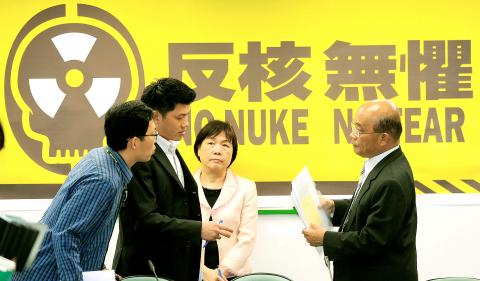The Democratic Progressive Party (DPP) yesterday said it plans to organize more than 1,000 anti-nuclear events before June to raise national awareness of the anti-nuclear movement, which would be instrumental in passing a referendum proposed by the government, scheduled to be held later this year.
The events are being organized by DPP members across the country, including by local offices, legislators and local government officials, and they are to be held in various forms, such as outdoor theaters, film screenings, rallies and bicycle rides, DPP spokesperson Lin Chun-hsien (林俊憲) said after the party’s weekly Central Standing Committee meeting.
While the DPP has argued that the government should directly order the suspension of construction of the controversial Fourth Nuclear Power Plant in New Taipei City’s (新北市) Gongliao District (貢寮) amid strong public opposition to the project, Lin said the party realizes that it will likely have to fight a battle as the government is insisting on resolving the controversy in a national referendum.

Photo: Lo Pei-der, Taipei Times
The party hopes to mobilize at least 10,000 people — a minimum of 100 at each event — so that they can become “seed drill masters” and influence more people by spreading the anti-nuclear message.
Opposition to the power plant has been rising, with 73.8 percent of respondents in the DPP’s most recent survey supporting the suspension of construction, while 14.8 percent supported the completion of the project, Lin said, citing a survey conducted by the party’s Poll Center on Tuesday.
The poll collected 1,031 valid samples and has a margin of error of 3 percentage points.
Meanwhile, the New Taipei City Council yesterday passed a resolution demanding that the central government suspend the construction of the power plant, becoming the first local council to make the demand.
The survey and the resolution in New Taipei City, where three nuclear power plants are located, shows that a high degree of consensus has been reached on the issue and that the anti-nuclear movement is now a campaign, DPP Chairman Su Tseng-chang (蘇貞昌) said.
As the entire country has been engaged in a heated debate over the use of nuclear energy as a source of electricity, the nation should step up its efforts to save energy, which is of equal importance to abandoning nuclear energy, Su said.
The DPP’s support for “green” energy is clear, Su said, adding that the utilization of solar energy and light-emitting diodes, among other things, are attainable goals.
“It is also important to break Taiwan Power Co’s monopoly of electricity production, distribution and sale,” Su said.

Japanese footwear brand Onitsuka Tiger today issued a public apology and said it has suspended an employee amid allegations that the staff member discriminated against a Vietnamese customer at its Taipei 101 store. Posting on the social media platform Threads yesterday, a user said that an employee at the store said that “those shoes are very expensive” when her friend, who is a migrant worker from Vietnam, asked for assistance. The employee then ignored her until she asked again, to which she replied: "We don't have a size 37." The post had amassed nearly 26,000 likes and 916 comments as of this

US President Donald Trump said "it’s up to" Chinese President Xi Jinping (習近平) what China does on Taiwan, but that he would be "very unhappy" with a change in the "status quo," the New York Times said in an interview published yesterday. Xi "considers it to be a part of China, and that’s up to him what he’s going to be doing," Trump told the newspaper on Wednesday. "But I’ve expressed to him that I would be very unhappy if he did that, and I don’t think he’ll do that," he added. "I hope he doesn’t do that." Trump made the comments in

Tourism in Kenting fell to a historic low for the second consecutive year last year, impacting hotels and other local businesses that rely on a steady stream of domestic tourists, the latest data showed. A total of 2.139 million tourists visited Kenting last year, down slightly from 2.14 million in 2024, the data showed. The number of tourists who visited the national park on the Hengchun Peninsula peaked in 2015 at 8.37 million people. That number has been below 2.2 million for two years, although there was a spike in October last year due to multiple long weekends. The occupancy rate for hotels

A cold surge advisory was today issued for 18 cities and counties across Taiwan, with temperatures of below 10°C forecast during the day and into tonight, the Central Weather Administration (CWA) said. New Taipei City, Taipei, Taoyuan and Hsinchu, Miaoli and Yilan counties are expected to experience sustained temperatures of 10°C or lower, the CWA said. Temperatures are likely to temporarily drop below 10°C in most other areas, except Taitung, Pingtung, Penghu and Lienchiang (Matsu) counties, CWA data showed. The cold weather is being caused by a strong continental cold air mass, combined with radiative cooling, a process in which heat escapes from